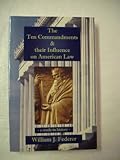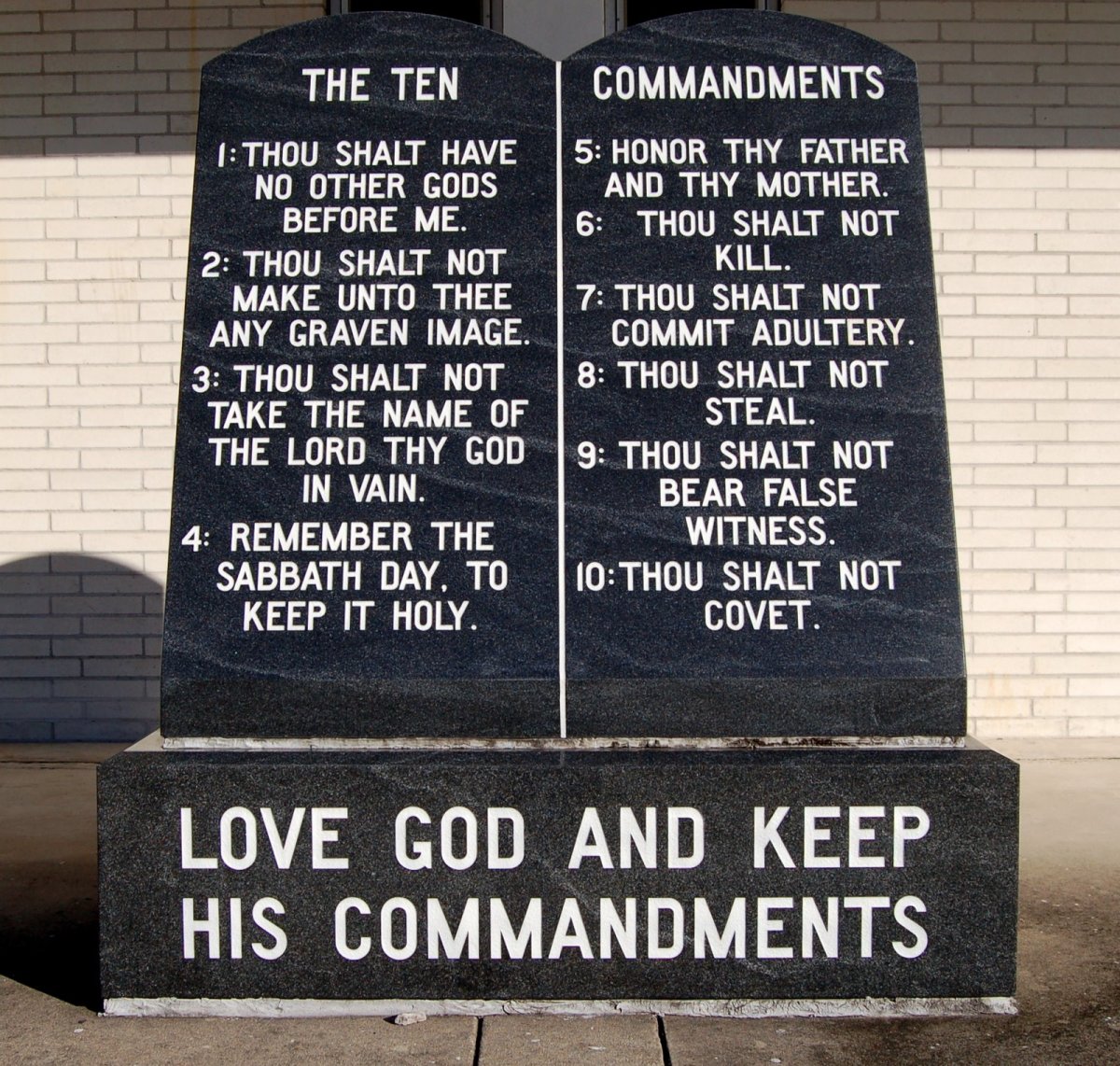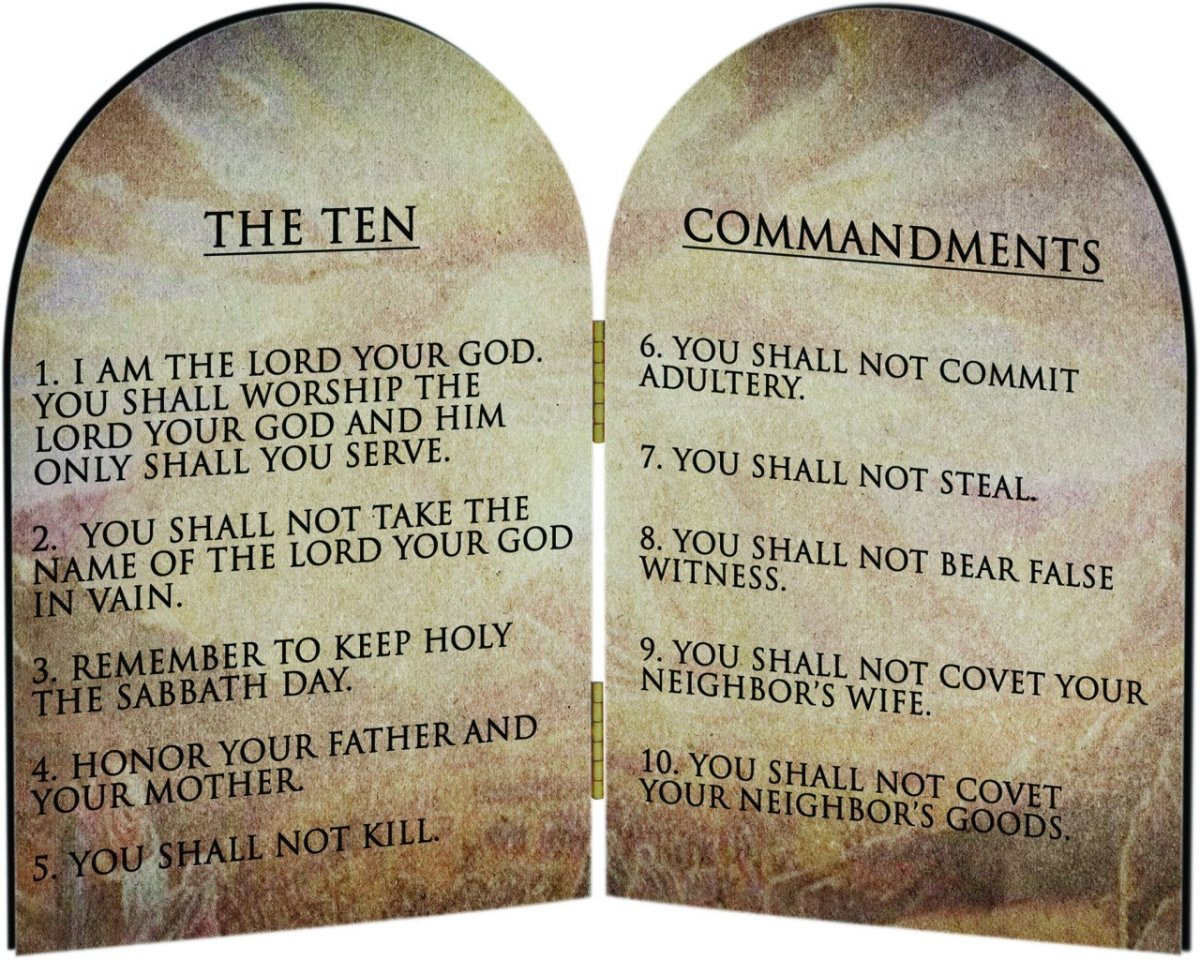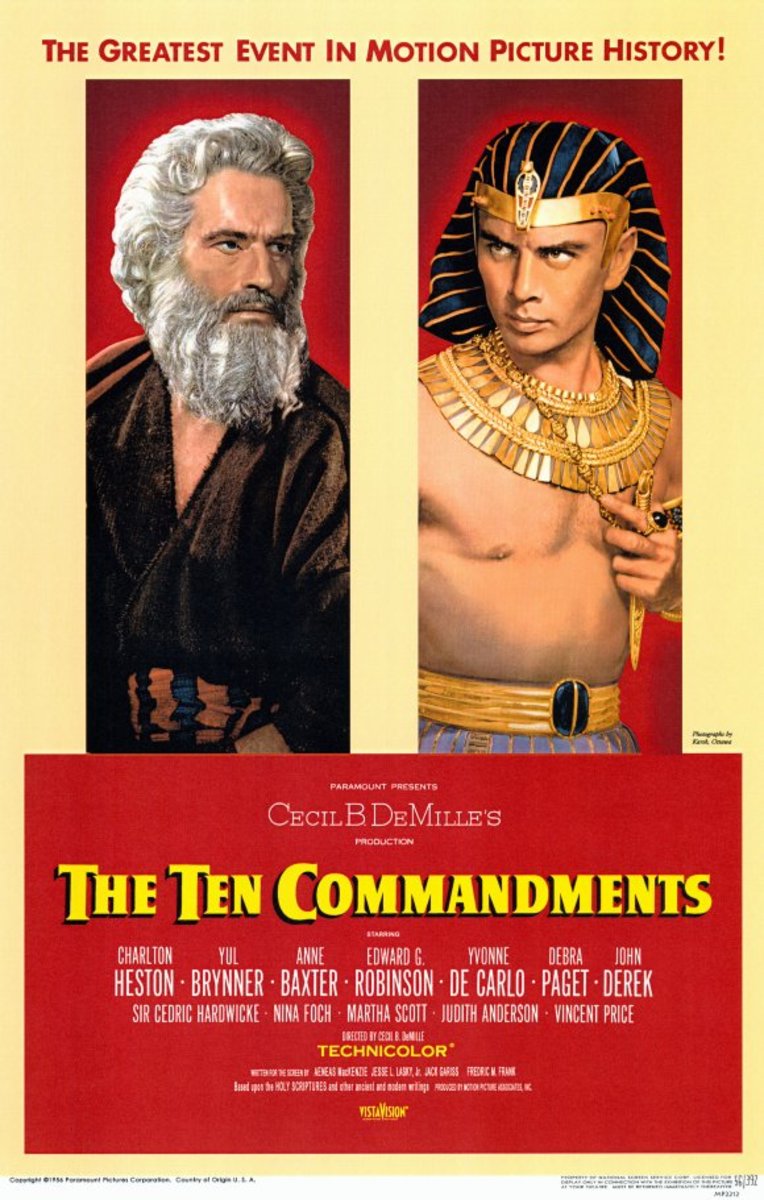If the Ten Commandements were a Legal Code
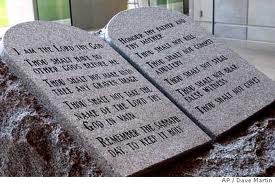
Scene from History of the World, Part One
The Ten Commandments in a Court Building?
Every now and then, a controversy comes up regarding the erection of religious-oriented monuments on government land. Sometimes, this involves the display of the Ten Commandments in some sort of a court building. Supporters of these displays argue that they are merely acknowledging these rules as a major foundation for our legal system. In my view, these people are seriously misled. The Ten Commandments, rather than being a foundation for our legal code, contradict the Constitution in some cases. In addition, certain commandments could never be practically enforced as legal ordinances. The Ten Commandments is primarily a religious and moral code, not a legal one, a fact that I will briefly demonstrate by taking a quick look at each commandment.
Commandments 1-4: Regulating Religious Practice
1) “You shall have no other gods before me.” The opening statements of the First Amendment guarantee the freedom of religion. So the Constitution guarantees our right to commit the ultimate Biblical sin of worshipping other Gods. So unless you think that the United States should be a theocracy, it is hard to justify placing a code in a legal building with an opening command that flies in the face of such an important Constitutional principle.
2)“You shall not make for yourself an image in the form of anything in heaven above or on the earth beneath or in the waters below.” See my response to commandment one. In my view, if religious monuments are to be placed in public places, then we should give equal treatment to all religions. So right next to the Ten Commandments, crosses, or anything else, we should erect some “brazen images” and “idols” from other religious traditions. Since the state is constitutionally forbidden from “respecting an establishment of religion,” we should acknowledge all religious traditions in public places or none at all. Plus, if the term “image” was interpreted very broadly, a lot of artists could get in some serious trouble.
3) “You shall not misuse the name of the LORD your God.” I have heard this explained in different ways. Some would say that this forbids blasphemy or the use of God’s Hebrew name, but I have heard this also interpreted as a command against more general profanity: “God damn it!”, “Jesus Christ!”, etc. Either way, it seems to contradict freedom of expression. Of course, some could counter that there are restrictions on freedom of speech and the press such as rules regarding obscenity. And there was a time when the censors were much tighter regarding the mainstream media. So assuming that these rules do not in principle contradict the First Amendment, maybe this commandment could be seen as a foundation for “obscenity laws.” Hopefully, however, no one wants to go back to stoning people for “blasphemy.” That could get ugly fast.
4) “Remember the Sabbath day by keeping it holy.” To make this a legal code, you would first have to determine which Sabbath to keep holy. Should it be the original Sabbath of Friday evening until Saturday evening, or should we go with the more recent Christian tradition of observing it on Sunday? Plus, legal scholars would have to spend a lot of time defining what is meant by work. It’s hard to imagine this ever being strictly enforced. Many Americans (and shopping malls) would freak out without weekend shopping. Also, it would eliminate Americans’ true national religion of watching sports on the weekend. You would need a very large Sabbath police to keep the masses in line.
Laws are supposed to be created in order to promote the public good: to maintain order, defend the state, and protect individual rights. They are designed to stop people from engaging in behaviors that harm others. Try as I might, I can’t see how the breaking of commandments one through four infringes on the rights of others. Worshipping idols, working on the Sabbath, and misuse of God’s name have no measurable, negative impact on anyone else. Obedience of these commands does not in itself promote ethical behavior or civic responsibility. Instead, these commandments attempt to shape the theological beliefs of people and promote obedience to God for its own sake. Personally, I do not want to live under a legal code that seeks to promote a certain mode of thought and forces me to follow a purely religious tradition. An orthodox system of belief is impossible to enforce anyway. People may give the appearance of faith, but there is no way to determine if it is legitimate.
Amendments 5-10: Regulating Human Interaction
5) “Honor your father and your mother.” Because I cannot read Hebrew, I’m not quite sure what was meant by honor. As we all know, there are some parents out there who are not worthy of honor or obedience. In some cases, the honoring of parents can lead someone into behavior that is downright evil, behavior that contradicts other commandments. Still, respect of elders is a nice ideal to strive for. It cannot really be enforced, however, as part of a legal code. If people were punished every time that they dishonored their parents, there would be a whole lot of fines being paid or prison sentences being served. You would need an enormous police force just to deal with the damn teenagers.
6) “You shall not murder.” This is one commandment that has to be a part of any rational legal code. It’s basically a no-brainer. Killing another person clearly infringes on that person’s rights. There may be some debate, however, regarding what murder actually means. Most people with a Judeo-Christian belief system, after all, believe that killing is justified in certain situations: self-defense, policing, military action, etc. Extreme pacifists, however, might see all killing as murder. But given the fact that Old Testament law mandated the death penalty as punishment for just about anything, along with the fact that the Biblical God frequently kills people or instructs his followers to do so, it is difficult to both accept scripture as truth and be an extreme pacifist.
7) “You shall not commit adultery.” If I am not mistaken, adultery is defined as sex outside of marriage, not merely cheating on one’s spouse. Either way, it is hard to imagine this instituted as law. For lawmakers, after all, this would hit too close to home. If adultery were punished, however, it would at least force “Family Values” conservatives to go after one of the behaviors – along with divorce - that actually threatens marriage. It could also go a long way toward either reducing budget deficits through the collection of fines or increasing the already swelling prison population. It would also create the opportunity to produce a reality show called “Sex Cops,” although this would have to be on cable due to graphic content.
8) “You shall not steal.” This is another legally enforceable commandment that is a no-brainer as part of a legal code. Protecting property is one of the essential functions of government. The term “steal,” however, can be a bit tricky. If a government taxes its people beyond what is reasonable or necessary, is this stealing? If a worker is exploited to the point that he or she cannot reasonably survive, would it be wrong to steal food? In a world filled with massive social inequality and injustice, a world in which governments often exist to serve the leaders rather than the general population, is it okay to disobey unjust laws instituted by lousy lawmakers? The Bible does not seem to provide any clear answers to these obvious questions.
9) “You shall not give false testimony against your neighbor.” In certain circumstances, you can be punished for lying: perjury, slander, fraud, etc. It can be difficult to determine, however, when a “little white lie” crosses over into illegal territory. If people were punished for every lie, that would definitely take care of all the people not already paying the price for breaking the Sabbath, committing adultery, or dishonoring their parents. And the politicians and lawyers charged with making, interpreting, and helping to enforce laws would have trouble winning elections and cases.
10) “You shall not covet your neighbor’s house. You shall not covet your neighbor’s wife, or his male or female servant, his ox or donkey, or anything that belongs to your neighbor.” I think that I could probably avoid coveting my neighbor’s farm animals or servants. But I hate to admit that envy may occasionally creep in when it comes to the other items in commandment 10. I probably have no need to worry. This one would really be a bitch to enforce. In theory, however, it may be possible someday to detect coveting with technology. A certain part of the brain may trigger when we feel envy, so maybe a covet detector could be created that will go off at the appropriate time. A message could then quickly be sent to law enforcement so that they could instantly withdraw funds from my bank account. Man, talk about taking a cut out of budget deficits. But without this kind of technology, I guess that we would have to go with the covet police or with citizen’s arrests in which people are quickly cited when they get that covetous look in their eyes.
The principles of amendments five through ten can at least be viewed as the moral foundation for many laws. Instead of dealing with religious beliefs, they deal with how people interact with one another. The enforceable ones, however, are pretty obvious and vague, and they do not represent a major legal or moral insight by the people who compiled the code. Others represent noble ideals to strive for but not rules that could be reasonably enforced. So arguing that these somewhat vague, unoriginal, and often unenforceable commandments played a major role in the development of our legal system is a bit of a stretch.
Does Anyone Want a Biblical Law Code?
Of course, Jewish law got a lot more detailed than the Ten Commandments. Few Americans, however, would ever want to go back to that legal system. The rules are often too outdated or silly, the punishments are too harsh, and way too many animals had to be dismembered every day to offer sacrifices of atonement in order to make up for our constant disobedience. If you don’t believe me, try a simple experiment. First, try to find someone who knows little about the Bible. In the United States, that is just as easy as finding someone who knows almost nothing about the Constitution. Then, pick and choose some random Biblical laws and the punishments for breaking them. When you are done, ask them what they think of this legal system. Whether the person was Jewish, Christian, agnostic, or atheist, I think that you can predict what their response will be.


